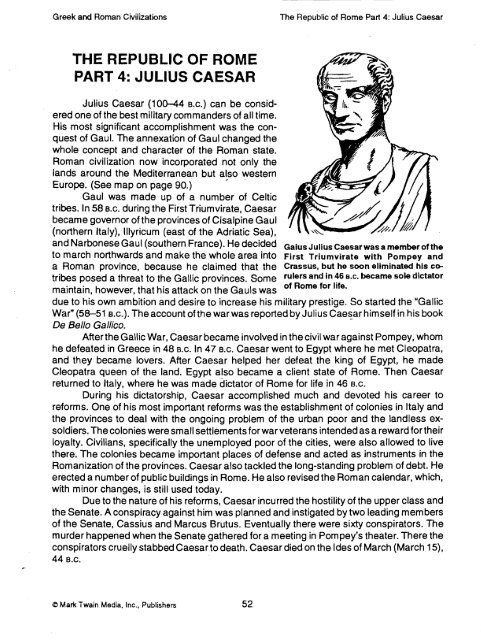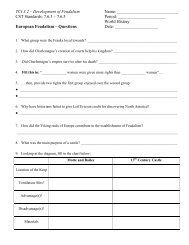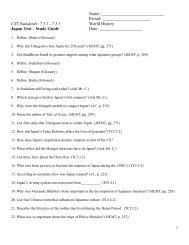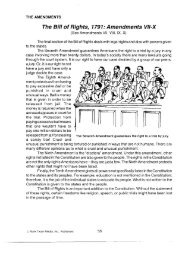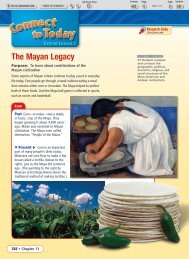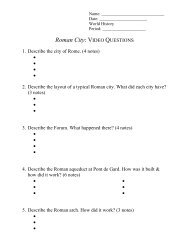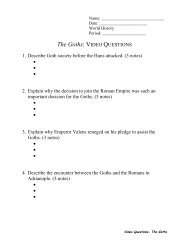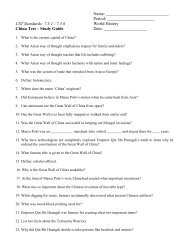the republic of rome part 4: julius caesar - TheMattHatters
the republic of rome part 4: julius caesar - TheMattHatters
the republic of rome part 4: julius caesar - TheMattHatters
Create successful ePaper yourself
Turn your PDF publications into a flip-book with our unique Google optimized e-Paper software.
Greek and Roman CivilizationsThe Republic <strong>of</strong> Rome Part 4: Julius CaesarTHE REPUBLIC OF ROMEPART 4: JULIUS CAESARJulius Caesar (100-44 B.c.) can be consideredone <strong>of</strong> <strong>the</strong> best military commanders <strong>of</strong> all time.His most significant accomplishment was <strong>the</strong> conquest<strong>of</strong> Gaul. The annexation <strong>of</strong> Gaul changed <strong>the</strong>whole concept and character <strong>of</strong> <strong>the</strong> Roman state.Roman civilization now incorporated not only <strong>the</strong>lands around <strong>the</strong> Mediterranean but also westernEurope. (See map on page 90.)Gaul was made up <strong>of</strong> a number <strong>of</strong> Celtictribes. In 58 B.C. during <strong>the</strong> First Triumvirate, Caesarbecame governor <strong>of</strong> <strong>the</strong> provinces <strong>of</strong> Cisalpine Gaul(nor<strong>the</strong>rn Italy), lllyricum (east <strong>of</strong> <strong>the</strong> Adriatic Sea),and Narbonese Gaul (sou<strong>the</strong>rn France). He decided Gaius Julius <strong>caesar</strong> was a member <strong>of</strong><strong>the</strong>to march northwards and make <strong>the</strong> whole area into First Triumvirate with Pompey anda Roman province, because he claimed that <strong>the</strong> Crassus, but he soon eliminated his cotribesposed a threat to <strong>the</strong> Gallic provinces. Some rulers and in 46 B.c. became dictator<strong>of</strong> Rome for life.maintain, however, that his attack on <strong>the</strong> Gauls wasdue to his own ambition and desire to increase his military prestige. So started <strong>the</strong> "GallicWarw (58-51 B.c.). The account <strong>of</strong> <strong>the</strong> war was reported by Julius Caesar himself in his bookDe Bello Gallico.After <strong>the</strong> Gallic War, Caesar became involved in <strong>the</strong> civil war against Pompey, whomhe defeated in Greece in 48 B.C. In 47 B.C. Caesar went to Egypt where he met Cleopatra,and <strong>the</strong>y became lovers. After Caesar helped her defeat <strong>the</strong> king <strong>of</strong> Egypt, he madeCleopatra queen <strong>of</strong> <strong>the</strong> land. Egypt also became a client state <strong>of</strong> Rome. Then Caesarreturned to Italy, where he was made dictator <strong>of</strong> Rome for life in 46 B.C.During his dictatorship, Caesar accomplished much and devoted his career toreforms. One <strong>of</strong> his most important reforms was <strong>the</strong> establishment <strong>of</strong> colonies in Italy and<strong>the</strong> provinces to deal with <strong>the</strong> ongoing problem <strong>of</strong> <strong>the</strong> urban poor and <strong>the</strong> landless exsoldiers.The colonies were small settlementsfor war veterans intended as a reward for <strong>the</strong>irloyalty. Civilians, specifically <strong>the</strong> unemployed poor <strong>of</strong> <strong>the</strong> cities, were also allowed to live<strong>the</strong>re. 'The colonies became important places <strong>of</strong> defense and acted as instruments in <strong>the</strong>Romanization <strong>of</strong> <strong>the</strong> provinces. <strong>caesar</strong>also tackled <strong>the</strong> long-standing problem <strong>of</strong> debt. Heerected a number <strong>of</strong> public buildings in Rome. He also revised <strong>the</strong> Roman calendar, which,with minor changes, is still used today.Due to <strong>the</strong> nature <strong>of</strong> his reforms, Caesar incurred <strong>the</strong> hostility <strong>of</strong> <strong>the</strong> upper class and<strong>the</strong> Senate. A conspiracy against him was planned and instigated by two leading members<strong>of</strong> <strong>the</strong> Senate, Cassius and Marcus Brutus. Eventually <strong>the</strong>re were sixty conspirators. Themurder happened when <strong>the</strong> Senate ga<strong>the</strong>red for a meeting in Pompey's <strong>the</strong>ater. There <strong>the</strong>conspirators cruelly stabbed Caesar to death. Caesar died on <strong>the</strong> Ides <strong>of</strong> March (March 15),44 B.C.0 Mark Twain Media, Inc., Publishers
.............................................................Greek and Roman CivilizationsThe Republic <strong>of</strong> Rome Part 4: Julius CaesarNameDateCHALLENGES 0- vt: 1. Who was Julius Caesar?0'?2. Which region did Caesar annex to <strong>the</strong> Roman state?: 3. Why did Caesar decide to march against <strong>the</strong> Gauls?4. What was <strong>the</strong> reason given by Caesar's critics for his conquest <strong>of</strong> Gaul?-5. Which Roman leader did Caesar fight during <strong>the</strong> civil war?6. Who did Caesar make queen <strong>of</strong> Egypt?7. Which <strong>of</strong> Caesar's reforms is still used today?8. Who murdered Caesar?9. On which day was Caesar murdered?10. What was <strong>the</strong> function <strong>of</strong> a colony?@ Mark Twain Media, Inc., Publishers 54


